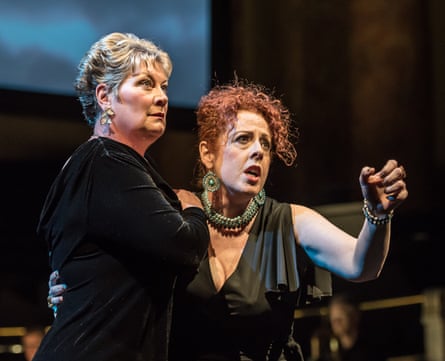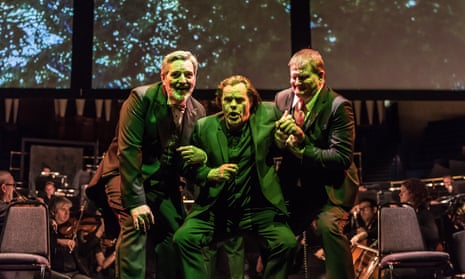During his visit to London in 1877, Richard Wagner was thrilled by what he saw of Victorian London from the river. “This is Alberich’s dream come true,” he enthused to his wife, Cosima: “Nibelheim, world dominion, activity, work, everywhere the oppressive feeling of steam and fog.”
The world dominion, the steam and the fog may be long gone, but Opera North has finally brought its much-praised semi-staged concert performances of Wagner’s Ring tetralogy to the same banks of the Thames, where this week’s keenly anticipated performances have been sold out for a year. And with what perfect timing, too, for Tuesday’s performance of Das Rheingold. To have this of all operas, this epic story of power, greed, deceit, lies and self-delusion, performed in the midst of Britain’s current political dog-fighting and economic turmoil – well, it doesn’t get any better or more resonant than this for us political Wagnerites. Art and life can rarely have been in a more dramatic synthesis.
For Wagner purists, these Festival Hall performances may be a troubling experience. Not only is the full Wagnerian orchestra right there on the platform, but the stagecraft that is an essential part of the “total artwork” conception is stripped to a bare minimum of gestures and poses. And yet it is rare to encounter such a concentrated and riveting realisation of the work as this, with the story explained simply and the words translated on a triptych of atmospherically illustrated video screens behind the orchestra, and without any of the directorial pretension and visual clutter that weighs down so many stagings. This is back-to-basics Wagner, and in many respects it feels like a liberation.

It feels that way because, with some caveats, the musical and vocal realisations are so well prepared and executed. Preparation is the key to good Wagner performances, and it shows here time and again. Richard Farnes paces and moulds his Opera North orchestral forces with real mastery so that the singers are not overwhelmed – though Wagner is attentive to that, too – before letting rip for the self-deluding entry into Valhalla at the end.
Vocally, this Rheingold was dominated, as the work is so often, by an outstanding Alberich, Jo Pohlheim, who brought incisiveness and real authority to a character, who is in so many ways Wotan’s equal and opposite, and an authoritative Loge, Wolfgang Ablinger-Sperrhacke. Michael Druiett, the first of the week’s three Wotans, sang with refined tone, though the Rheingold Wotan’s higher-lying music occasionally taxed him. Yvonne Howard was a noble Fricka and James Creswell and Mats Almgren a suitably imposing Fasolt and Fafner. Yes, there were blemishes, but it is already clear that the word from the north was right: this is a Ring cycle to treasure.
- Further operas in the cycle are at the Royal Festival Hall, London, on 29 June, 1 and 3 July. Box office: 020-7960 4200. All four performances are then at Sage Gateshead, 5-10 July. Box office: 0191-443 4666.

Comments (…)
Sign in or create your Guardian account to join the discussion